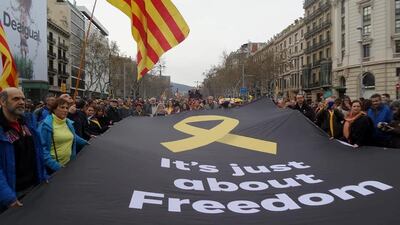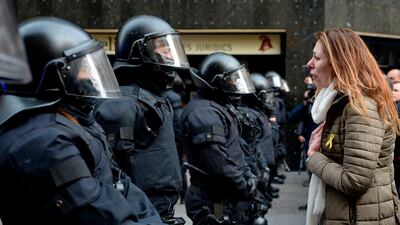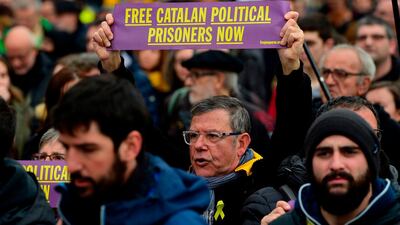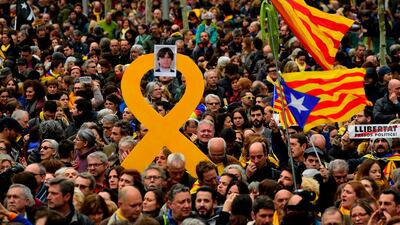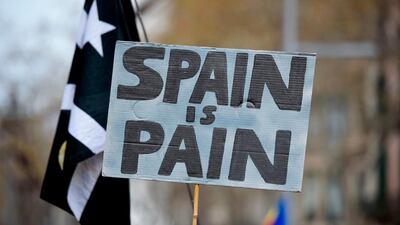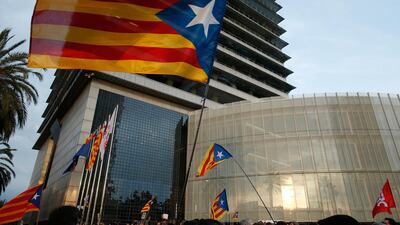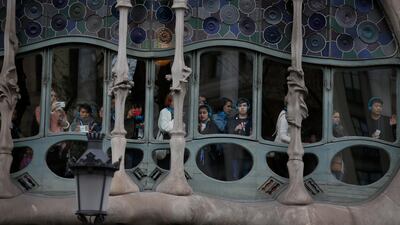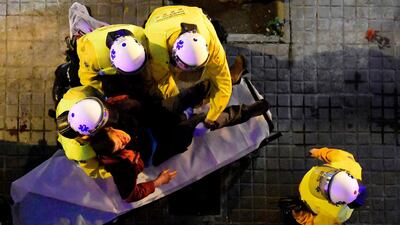Former Catalan president Carles Puigdemont has been arrested by German police while travelling across the Danish border.
The ousted leader of the semi-autonomous region in Spain was detained yesterday on his way back from Finland to Belgium, where he has been living since October.
“The president was going to Belgium to put himself, as always, at the disposal of Belgian justice,” Mr Puigdemont’s lawyer Jaume Alonso-Cuevillas said on Twitter.
Mr Puigdemont’s capture, aided by Spanish intelligence services, sparked protests of tens of thousands demonstrators in Catalonia’s main city of Barcelona and other towns in the wealthy northeastern corner of Spain. One group clashed with riot police.
In Barcelona, riot police shoved and struck protesters with batons to keep an angry crowd from advancing on the office of the Spanish government’s representative. Police vans showed stains of yellow paint reportedly thrown by protestors.
German police confirmed they had arrested Mr Puigdemont in the northern state of Schleswig-Holstein, near the Danish border.
Mr Puigdemont fled to Brussels last year from Spain where he is wanted on charges of sedition and rebellion after his attempt while leader of the Catalan government to declare independence from Madrid.
A Spanish Supreme Court judge had reactivated a European arrest warrant for Mr Puigdemont on Friday, after he travelled to Finland to speak at an event.
The exiled politician previously made trips to Denmark and Switzerland to seek support for his secessionist movement.
He left Finland on Saturday when it became clear that authorities there would act on the international arrest warrant.
Mr Puigdemont was about two thirds of the way through his 2,000-kilometre car journey when he was stopped at a petrol station, 50km into German territory, his lawyer said.
The Spanish state prosecutor’s office said it had made contact with Germany about an extradition request to return Mr Puigdemont, 55, to Spain. Madrid has also activated arrest warrants for five other Catalan politicians who had fled abroad.
“Following the arrest of Carles Puigdemont, Spain’s state prosecution is in contact with Germany’s state prosecution service and Eurojust to make sure they have all the documentation they need,” a spokesman for the Spanish state prosecutor said.
Mr Puigdemont was expected to appear before a judge last night or today and will be asked whether he will agree to be extradited.Elsa Artadi, a spokeswoman for his Junts per Catalunya party, said he should fight extradition. “Spain does not guarantee a fair trial, only revenge and repression,” she wrote on Twitter.
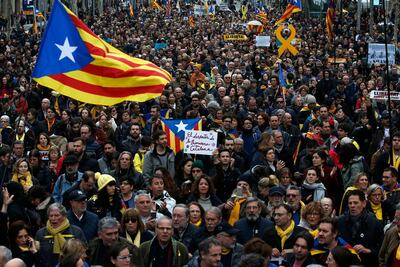
Spain was plunged into a constitutional crisis last year after the referendum vote and the Catalan parliament’s declaration of independence, which was never internationally recognised.
Spanish Prime Minister Mariano Rajoy called an election for December as Madrid took over the parliament. Anti-independence party Citizens won the most votes, while secessionist parties kept a slim majority in the parliament.
After Mr Puigdemont’s arrest, Albert Rivera, leader of the pro-union Ciudadanos party, tweeted: “Coup leader Puigdemont’s escape has been brought to an end. There should be no impunity for someone who tries to destroy a European democracy, flout democratic laws, fracture co-existence and misuse public funds to do so. The justice system has done its job.”
PProtesters marched through Barcelona yesterday in support of the five separatist leaders detained on Friday for their part in the independence bid.
______________
Read more:
Protests after Spain detains independence leaders
Spain charges exiled Puigdemont and 12 Catalan leaders with rebellion
Carles Puigdemont pulls out of Catalan presidential race
_______________
The five were held as part of a prosecution of 13 Catalan leaders for rebellion, a crime that carries a prison sentence of up to 30 years. They were deemed to be flight risks.
Former Catalan Parliament president Carme Forcadell and three former regional ministers were held in custody alongside presidential candidate Jordi Turull.
Secessionists had planned for Mr Turull to be inaugurated as president on Saturday morning after Mr Puigdemont withdrew his candidacy this month.
The five join four other separatists who were already being detained by the Spanish authorities.
